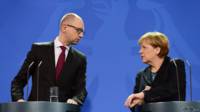- January 8, 2015
Post

German Chancellor Angela Merkel said that the sanctions imposed by the European Union in relation to Russia in connection with its role in the conflict in eastern Ukraine, may be withdrawn subject to Minsk arrangements.
However, the sanctions imposed in response to the Russian annexation of the Crimea are unlikely to be reversed in the near future, says Merkel, since it is unlikely that Moscow refuses to reconsider its decision to join the peninsula.
“On this account I have little hope. Other sanctions were imposed in response to the invasion of eastern Ukraine. The full implementation of the agreements Minsk – is a way to revise [sanctions],” – said the Chancellor after talks in Berlin with the Prime Minister of Ukraine Yatsenyuk.
Angela Merkel stressed that “progress in Minsk agreement should be fully implemented before we can start talking about the abolition of the package of sanctions”.
The West accuses Russia of military assistance to separatists in the east of Ukraine and in direct military involvement in the conflict in the Donbass. The Russian authorities have denied these charges.
Angela Merkel also said that the Foreign Minister of Russia, Germany, Ukraine and France – the countries of the so-called “Norman Quartet” – are currently preparing the summit in Astana on January 15 but it is not known whether it will be held.
“Restricted positive signals”
According to Merkel, the ceasefire in the east of Ukraine has observed, but it is possible that the situation may change.
“There is progress in complying with the ceasefire, however fragile truce,” – said the Chancellor.
On the possibility that Russia will change its position on the crisis in Ukraine, said the head of EU diplomacy and Federica Mogherini at a press conference in Riga.
According to Mogerini, filed in December Russian “limited positive signals”, which indicate that Moscow could change the approach to conflict in eastern Ukraine.
Do not “put Russia to its knees”
In recent years, several high-ranking Western European politicians have made statements about the possibility of lifting the sanctions imposed against Russia due to the Ukrainian crisis.
A few days ago, Vice-Chancellor of Germany, Sigmar Gabriel, warned that further tightening of sanctions against Russia could further destabilize the situation and plunge the country into chaos.
“We want help resolve the conflict in Ukraine, and not to put Russia on its knees “- Gabriel said in an interview Sunday with the German newspaper Bild am Sonntag. The purpose of sanctions – to force Russia to the negotiating table, said Gabriel.
On Monday, French President Francois Hollande also said the possibility of removal of Western sanctions against Russia – but only in the case of progress in resolving the crisis in eastern Ukraine.
“I think we have to stop the adoption of new sanctions – Hollande said in an interview with radio station France Inter. – If progress is made, the sanctions should be lifted. If progress is not, sanctions remain in force.”
Sanctions and recession
According to Hollande, Russian leader Vladimir Putin “has already paid dearly enough” for “its actions in the south-east of Ukraine”.
The Russian authorities – including President Putin – have repeatedly stated that they consider sanctions hostile and counterproductive.
One of the packages of Western sanctions actually closed to Russian companies with state participation, access to foreign markets funding. In addition, the US and the EU imposed sanctions against businessmen from the immediate vicinity of Vladimir Putin.
The sanctions against Russia were introduced in stages since March this year, when the Russian government annexed the Crimea after the referendum, unrecognized by the international community.
Since then, the ruble fell by 40% against the dollar and the euro. In December, the World Bank downgraded its forecast for the economy of Russia in the years 2015-16. Instead of stagnation bank experts now predict the most likely scenario for 2015 recession.
No comments:
Post a Comment